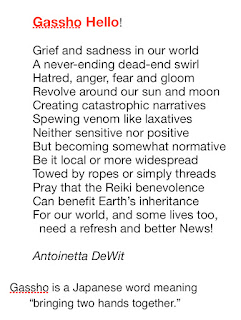THE POWER OF POETRY
I can remember sitting in a Grade 10 English class when, for the first time in my adolescent life, my classmates and I were introduced to a four week poetry module. It was a new add-on to replace grammar. We were so excited as anything had to be better than grammar!
The introduction was very motivating as we learned that the lyrics for key songs of the times started off as poems. We listened to our favourite singers like Janis Joplin, Leonard Cohen and Gordon Lightfoot, and had so much fun. Through that experience we picked up poetic elements such as beats per line (ionic pentameter) and rhyme schemes. By listening to those lyrics over and again, we also grasped a better understanding of what was being said, and how thoughts were being expressed.
The purpose to that introduction was to lure us to the bigger world of actual poems. This became a struggle and students began to lose interest because metaphors and similes, double meanings and hidden messages, were not their “thing”. It became even less interesting to try to create our own poems based on what we had learned.
Fast forward to my studies at Simon Fraser University in the 1970s — the years of flower power, free speech, hippy life, drugs, sex and liberties.
One of my Canadian Studies classes included a poetry module. Just seeing it listed in the course outline made me quiver; but, the bolder side of me, now more accepting of the odd and weird and different, opted to find light in the darkness of my high school poetry memories. I knew I would have to step outside of my usual self and approach this assignment very differently.
One of the first poems for analysis had a mishmash of possibly fourteen lines. Some were left justified, some centered and some right. A few only contained two words with long spaces between. I can’t remember if there was any rhyming, but I felt there was a rhythm of sorts — a different kind of rhythm. The general class consensus was how can this be a poem and, if it is, why is it presented in this way? Students felt frustrated overly challenged, and wanted to drop the class. But, I took it as a welcome challenge.
I decided to not initially focus on the contents, but on the layout. It was mysterious and weird, and it had to be that way for a reason. The reason didn’t come to me right away, but when I put my mind into an almost hallucinating trance, light began to shine through the darkness of the unknown. I then read the lines over and again, and discovered there was a relationship between the layout and the message.
I took my pencil and drew a vertical line along the first letter of each first word and a second line along the last letter of each last word, and an image appeared. It kind of portrayed a naked body, twisted and wretched, bent over and crouched. Very spaced out. I read the poem again and could hear the voice of a sad woman, feeling scattered and shattered, broken and lost. The poem was describing the reality of a battered, defeated woman, stripped of warmth, living a sorry life with no rhyme but, devastating rhythm.
I can remember presenting my theory with absolute confidence to the class. Jaws dropped as I sat there wondering what was wrong with these people. Beyond gasps, snickers and rumblings, they simply could not speak. They thought I was high on something I suppose. I definitely was high, but not on what they no doubt concluded.
I cannot honestly remember enjoying a university class more than that one. I stumped everyone, including the professor who gave me thumbs up and top marks.
As such my entire insides smiled and, to this day, I continue to smile when I see a poem or challenge myself to write one.
World Poetry Day, for me, is a good day to remember my dabblings with the interesting creative strength of poetry, including its rhyme, rhythm and reason; and, it might be a good day for others to take on a new mental challenge as well. It’s never too late to nurture our intellectual abilities, including our freedom to think outside of our comfort box. No drugs required.
Happy World Poetry Day! (March 21, 2025)



No comments:
Post a Comment